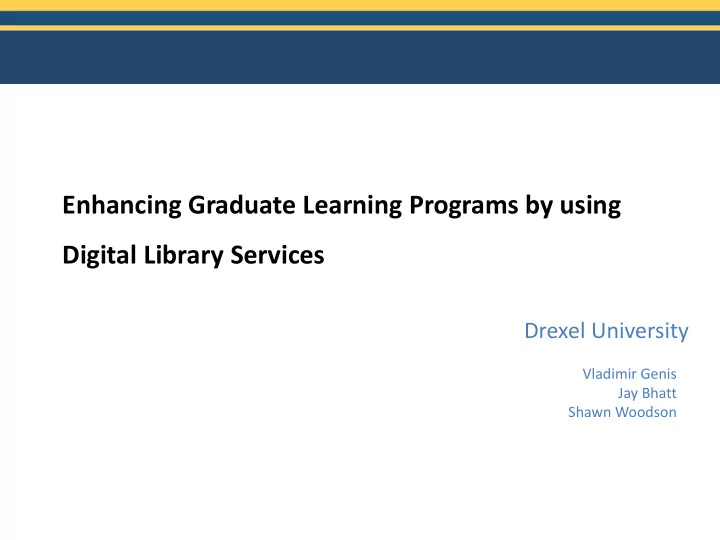

and Other Tools for Virtual Fast and Enhancing Graduate Learning Programs by using Digital Library Services Milliken, and Jay Bhatt and Jay Bhatt Drexel University Vladimir Genis Jay Bhatt Shawn Woodson
Need for information research skills • New programs • New approaches for information dissemination – MSET Program – Materials properties – Computer applications – Quality control and production • Number of tools • Online books, handbooks and encyclopedias
Need for information research skills • Students not aware of various online resources available – ENGnetBASE – Knovel • True for online programs • Librarians role of information dissemination – Important role in teaching – Collaboration between faculty and librarians with graduate students crucial
Effective online instruction • Examples of instructional session: • Developing quality information seeking research skills Awareness of various resources • Keeping current with new technological developments • Efficient management of quality references
www.library.drexel.edu
Services for Distance Students
Instructional Methods • Web conferencing technologies – Adobe Connect Pro – Students learn new information research skills – No need to install anything on computer – Virtual Room where students converse and participate in live synchronous library session – Instructional handouts, readings, and homework assignments can be shared – Highly interactive and engaging virtual platform
User Interaction/Participation Features • Voice Chat • Text Chat • Yes/No Icons • “Raise Hand” Icon • Emoticons (Happy, Sad, etc.)
Adobe Connect online instructional session
E-Reference via Adobe Connect Synchronous instruction (scheduled) • Scheduled sessions for individuals or groups Asynchronous instruction (monologue) • Pre- recorded “tutorials on the cheap” Spontaneous instruction ( 1:1 ) • Conversion of a phone call or IM session * Agosto, Abels et al 2009, Future of Reference
Integrating Resources in an online course
Integrating Resources in an online course
Blogs
Resources for Engineering Technology
Research consultations for engineering design
An example of faculty recommendation • Professors include librarian contact information in their syllabus • Recommend students to consult librarians for research help
An example of faculty recommendation • Student contacts Jay by email. • Apparently, student did not do well in the mid-term. Professor recommended him to contact the librarian. • What now?
Simple technologies still powerful! • Jay asked student to see if it was okay to give him a call • Through phone conversation, blog page, and gmail chat, we explored databases to find scholarly articles
Simple technologies still powerful! • Telephone consultation combined with computer access – helped! • Final email from student: “Thanks for your help earlier in retrieving electronic journals and resources. I've attached an updated copy of my paper. It's due by 5pm on Saturday (3/13). If you have time, can you please review it”
Questions? http://www.library.drexel.edu/
References 1. Vladimir Genis, Warren Rosen, Michael Mauk, Radian Belu, Eric Carr, and Gerry Marekova. An Online Master of Science Program in Engineering Technology. Proceedings of the ASEE Conference, pp. 1-14, 2011. 2. Hooks, J. & Corbett, F. (2005). Information Literacy for off-campus graduate cohorts. Collaboration between a university librarian and a Master’s of Education faculty. Library Review, 54(4), pp. 245 -256. DOI: 10.1108/00242530510593434. 3. Sadler, E., & Given, L. (2007). Affordance theory: a framework for graduate students' information behavior. Journal of Documentation, 63(1), pp. 115 – 141. DOI: 10.1108/00220410710723911. 4. Rempel, H., & Davidson, J. (2008). Providing information literacy instruction to graduate students through literature review workshops. Issues in Science and Technology Libraries. 53, pp.12. 5. Nicholson, H., & Eva, N. (2011). Information literacy instruction for satellite university students, Reference Services Review, 39(3), pp. 497-513. DOI: 10.1108/00907321111161458. 6. Booth, C. (2008). Developing Skype-based reference services. Internet Reference Services Quarterly. 13(2), pp. 147-165. 7. Kilzer, R., Milliken, L., & Bhatt, J. (2011). Fast and Furious: Using Web Conferencing and Other Tools for Virtual Reference and Instruction. [accepted as chapter in] Reference Renaissance Proceedings. New York: Neal-Schuman [in press]. 8. York, A., & Vance, J. (2009). Taking library instruction into the online classroom: Best practices for embedded librarians. Journal of Library Administration. 49(1), pp. 197-209. DOI: 10.1080/01930820802312995. 9. Hensley, M., & Miller, R. (2010). Listening from a distance. A survey of University of Illinois distance learners and its implications for meaningful instruction. Journal of Library Administration, 50(5), pp. 670- 683. DOI: 10.1080/01930826.2010.488946.
References Cont’d 10. Nicholson H., & Eva N. (2011). Information literacy instruction for satellite university students. Reference Services Review. 39(3), pp. 497-513. DOI:10.1108/00907321111161458. 11. Secker J., & Macrae-Gibson, R. (2011). Evaluating MI512: an information literacy course for PhD students. Library Review. 60 (2), pp. 96-107. DOI: 10.1108/00242531111113050. 12. Rowlands, Ian, Nicholas, David, Williams, Peter, Huntington, Paul, Fieldhouse, Maggie, Gunter, Barrie, Withey, Richard, Jamali, Hamid R, Dobrowolski, Tom & Tenopir, Carol. (2008). The Google Generation: the information behavior of the researcher of the future ASLIB Proceedings. Aslib Proceedings. 60 (4), pp. 290-31. DOI: 10.1108/00012530810887953. 13. Bhatt, J, Dominey, P., & Pell, J. (2010). Graduate Student Information Literacy. Poster presented at SLA 2011 Annual Conference. http://hdl.handle.net/1860/3547. 14. Gutierrez, C., & Wang, J. (2001). A comparison of an electronic vs. print workbook for information literacy instruction. The Journal of Academic Librarianship. 27(3), pp. 208-12. DOI: 10.1016/S0099- 1333(01)00182-3. 15. Kilzer, Rebekah, Milliken, Larry and Bhatt, Jay. (Apri 24th, 2012). Fast and Furious: Using Web Conferencing and Other Tools for Virtual Reference and Instruction. Presentation at the Rutgers University Chapter of Beta Phi Mu, the International Library and Information Studies Honor Society, the Rutgers Club.
Recommend
More recommend